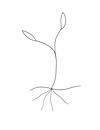Westmont Magazine Knecht’s Top Ten Things Every Westmont Grad Should Know
10. EAT MORE FROG FOR BREAKFAST.
I apologize to the vegetarians and vegans in the audience. Not only are frogs a sustainable food source, but they also serve as an attitude adjustment the first thing in the morning. The French writer Nicolas Chamfort once wrote that “the first thing you should do each morning is eat a live frog. Then you can go through the day with the satisfaction of knowing that is probably the worst thing that is going to happen to you.” So take all those tasks that you are dreading and get them done early in the morning. You’ll feel better the rest of the day.
9. DO WHAT YOU LOVE AND YOU’LL NEVER WORK ANOTHER DAY IN YOUR LIFE IS TERRIBLE ADVICE.
I love sitting on my couch in my PJs watching SportsCenter. Nobody’s going to pay me to do that. And even in jobs you love, you still have to do stuff you don’t like. I love teaching—I couldn’t imagine doing anything else—but I’m not especially passionate about grading a mountain of essays, especially the ones that begin with “Throughout human history...” or “Since the dawn of time...” or “Webster’s Dictionary defines political as of or related to politics.” You’re going to have to do stuff that you don’t love. What matters is how you approach those challenges, which leads me to No. 8.
8. HAVE A GROWTH MINDSET.
There are two types of mindsets: fixed or growth. People with a fixed mindset say “I’m not good at this.” People with a growth mindset say, “I may not be good at this now, but I’ll work until I get it.” People with a growth mindset are the ones who usually succeed. I may not be good at graduation speeches now, but I’ll be great for the Class of 2032.
7. THE LEFT LANE IS FOR PASSING ONLY.
Don’t cruise in the left lane; it causes me to sin when I drive behind you.
6. YOUR 20S CAN BE A STRUGGLE.
At graduation, everyone tells you you’re going to do great things and change the world. I hope and pray you do. But we can become discouraged if we’re not doing great things and changing the world. In my 20s, I worked a string of cruddy jobs, I had few friends and no money, and I was essentially dateless for three years. I say this to communicate three important truths. First, if you find yourself in a similar situation, remember you’re not alone. If you ask any older person, if they’re honest, they’ll tell you they’ve had periods in life when they struggled. More importantly, your God is with you. In Isaiah 41:10, God said, “Do not be afraid, for I am with you. Do not be discouraged, for I am your God. I will strengthen you and I will help you. I will hold you up with my victorious right hand.” Second, your 20s is a time when you have to be intentional about plugging in: to a church, to something bigger than yourself. For fun, join an ironic kickball league, a book club, or take up ballroom dancing. But plug in. Finally, don’t compare yourself to others. Social media gives you a distorted view of how much fun people are having. People only post the fun stuff on Instagram, such as trips to Hawaii. They never post pictures of themselves working in a cubicle or changing diapers at 2 a.m. You be you. In short, embrace the challenges that may soon come, for your God is with you.
5. IF YOU EVER GO TO NEW YORK, THERE ARE ABOUT 30 RAY’S PIZZAS.
They all claim to be the original. But the real one is on 11th.
4. TREAT MOST OF YOUR BELIEFS AS HYPOTHESES TO BE TESTED, NOT TREASURES TO BE GUARDED.
I really like this quote from psychologist Phil Tetlock. I have a small set of faith commitments that I treasure and guard. But for most other issues, I try, however imperfectly, to treat my beliefs as hypotheses to be tested.
That means we constantly test our beliefs against the available evidence. If the evidence is consistent with our beliefs, we keep them. But if the evidence demands we change our beliefs, then we change them. We don’t cling to worn-out beliefs out of sentimentality, blind partisanship, social pressures or whatever else might distort our thinking, which leads to No. 3.
3. BE SOMEONE WHO DELIBERATES, NOT DEBATES.
Deliberation is the thoughtful exchange of ideas with the possibility that you might change your mind based on the reasoned arguments of others. Debate is trying to “win” an argument. Deliberation is a search for truth; debate is an intellectual wrestling match with some supposed winner and loser. Deliberation requires humility; debate is born out of pride. Be someone who deliberates; it’s better for you, and it’s essential for society.
2. ONLY USE THREE WORDS WHEN ORDERING COFFEE AT STARBUCKS.
“Large coffee, please.” Or “medium latte, please.” An order of more than three words is pretentious and off-putting.
1. LOVE GOD AND LOVE OTHERS.
If you forget all my lessons, remember this one. It’s the only one that really matters. You have a perfect Lord and Savior who loves you and will always be with you. And our sovereign Lord calls us to love and care for his Creation. That means loving His people, even when it might be difficult to do so.
So on behalf of the Westmont faculty, I want to say how much we appreciated teaching and learning from you, and we want to congratulate you on a job well done!









